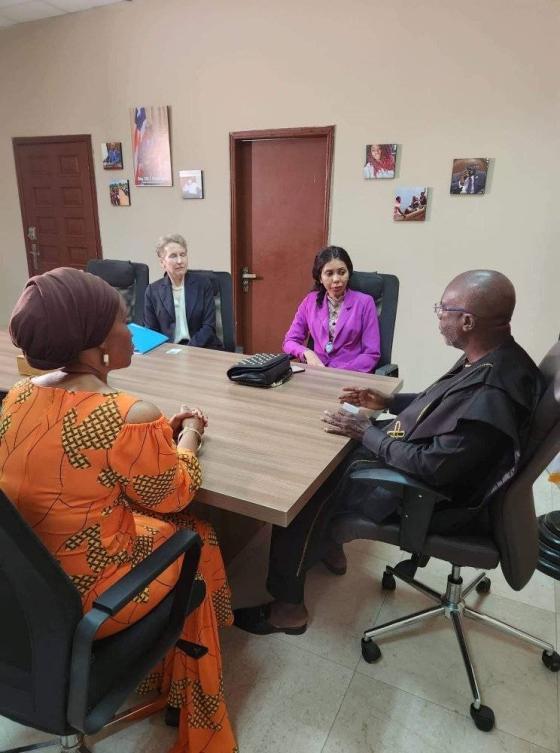Liberia: UN Goodwill Ambassador Lauds Deputy Speaker Koffa for Championing Laws against ‘FGM’

Jaha Dukureh (second from right) in conversation with Deputy Speaker Cllr. J. Fonati Koffa
The visiting UN Goodwill Ambassador for Africa, Jaha Dukureh, has lauded Deputy Speaker Cllr. J. Fonati Koffa over his efforts to put an end to Female Genital Mutilation (FGM) in Liberia.
Dukureh, a survivor of FGM and child marriage, has singled out the Deputy Speaker for ‘championing’ and ‘sponsoring’ a bill to outlaw the practices of FGM in the country.
“On behalf of all the women in the world, who have been subjected to this (FGM) practice and the young women who we are going to protect, thank you for the commitment and dedication to ending FGM in your country,” Dukureh said.
According to a UN report, 44 Percent of Liberian girls and women belong to the tribes that still recognize the practice in Sande Bush schools and it is likely almost all have undergone FGM.
But Koffa in June submitted a bill which, when enacted, could outlaw the practice of FGM in Liberia for the first time in the country’s history.
The bill, which has been lingering in the committee room since being voted on, despite Koffa’s plea that the time, has come for Liberian democracy to protect the weak by tackling the painful debate of the harmful traditional practice of ‘FGM’.
FGM affects more than 140 million girls and women across a swathe of Africa and parts of the Middle East and Asia and is seen as a gateway to marriage and a way of preserving a girl’s purity. It causes numerous health problems that can be fatal, according to WHO.
Half of the Liberian women have been subjected to FGM, and four in 10 support the practice in a country where it is carried out by all but a few tribes, and by both Muslim and Christian communities, according to the U.N. children’s agency (UNICEF).
The practice has however never been outlawed in Liberia. Just before she left office in January 2018, the President of Liberia at the time, Ellen Johnson Sirleaf, signed an executive order on the Domestic Violence bill to ban FGM on girls under 18 years old for one year.
The punishments at the time included rehabilitation and fines, which are determined on a case-by-case basis by traditional leaders.
Other than the temporary ban on FGM, various iterations of the bill seeking to make the practice a criminal offense have in the past suffered significant setbacks, with lawmakers dismissing the issue as a cultural matter.
In 2019, for example, Gender Minister Piso Saydee Tarr backed the removal of FGM from the Domestic Violence Bill, which President George Manneh Weah signed into law that same year.
Dukureh, however, praised Liberia for its cultural values and tradition earlier, saying Liberia, like the rest of Africa, has a rich culture but the need for abolition of FGM, cannot be overemphasized.
Dukureh noted that the good aspect of Liberian culture can be kept but those aspects that promote violence against women should not be tolerated.
Liberia remains one of the few African countries that do not have a law criminalizing FGM despite having signed and ratified regional and international human rights instruments condemning the practice as a human rights violation, including the Maputo Protocol.
In fact, the few cases that have gone through the justice system have been covered under Section 242 of the Penal Code, which speaks to malicious and unlawful injuries towards another person by cutting off or otherwise depriving him or her of any of the members of his body, finding a person guilty of a felony. This is punishable by up to five years in prison.
